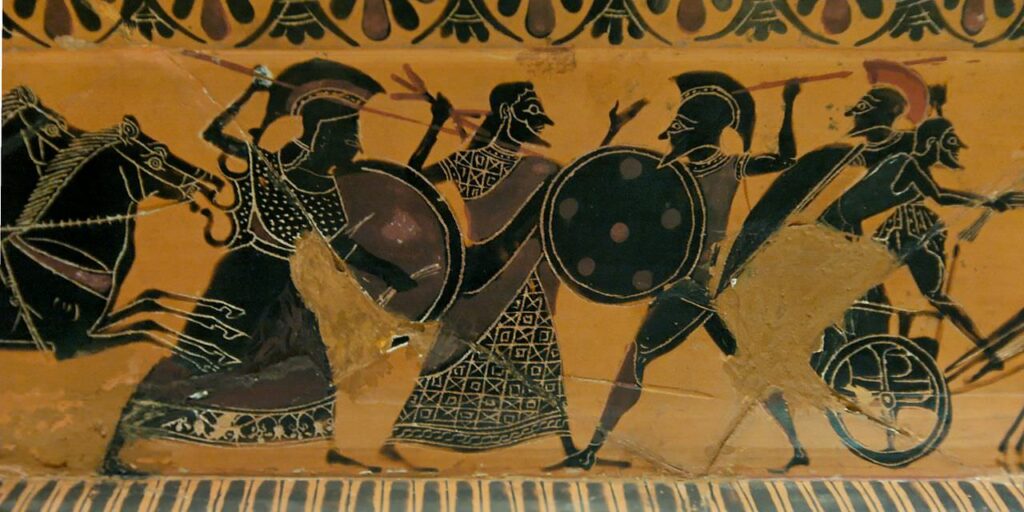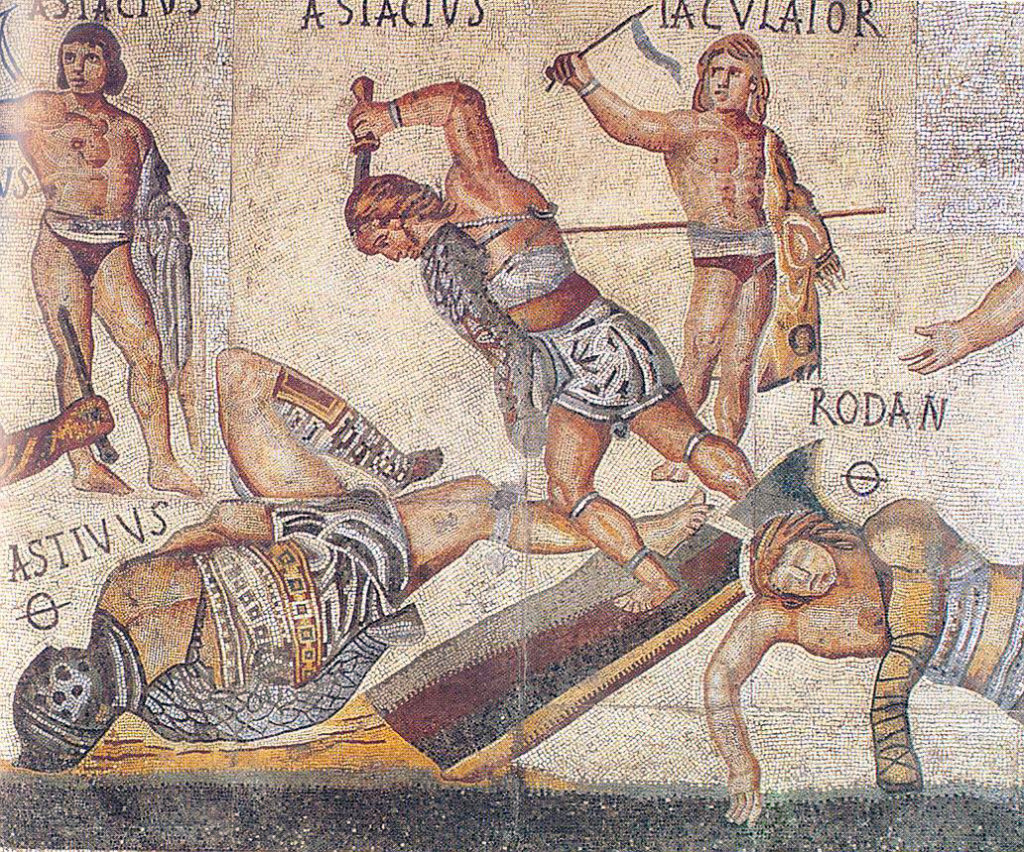Ares is the Greek god of war.
Battle personified, Ares represented many of the more gruesome aspects of warfare. Unlike his sister Athena, who was associated with calm strategy, Ares was all battle frenzy and violence. He wasn’t particularly popular with the Greeks, and even his family disliked him.
He found much more success with warmongering Romans. They worshiped him as Mars, foremost among the gods. But let’s start at the beginning…

The Olympians
Ares was one of the twelve primary deities of the Greeks. Often shown wearing a helmet and holding a spear, he resided on Mount Olympus with his parents, Zeus and Hera.
The other nine Olympians were Poseidon, Athena, Demeter, Aphrodite, Hermes, Artemis, Apollo, Hephaestus, and Hestia.
Zeus, Hestia, Demeter, Hera, and Poseidon were the children of the Titans Cronus and Rhea. It was prophesied that Cronus would be overthrown by one of his children, and so he consumed the first four. Before Zeus was born, his mother fled and hid herself away on the island of Crete.
Zeus eventually overthrew Cronus, and Rhea remained on Olympus to watch over her children and grandchildren.
In some tellings, Hera was swallowed along with her siblings. In others, she too was spirited away by her mother to be raised in secret elsewhere.
After their father was defeated and her brothers reigned over the Earth, Hera began a long and terrible relationship with her younger brother Zeus.
Family Ties
The remaining Olympians are all children of Zeus. Of them, only Ares and Hephaestus are also Hera’s children.
Zeus’s daughter Athena was the goddess of war. She too was often depicted with a helmet and a spear. Unlike her brother Ares, who was associated with brutality and bloodlust, Athena was associated with wisdom and strategy.
Like his father before him, Ares took up with his sister. Aphrodite, daughter of Zeus and the goddess Dione, was married against her will to her brother Hephaestus but continued to consort with Ares. She bore many children. Two of her sons were fathered by Ares.
Called Deimos and Phobos, these two sons of Ares and Aphrodite personified the fear and panic induced by war. They served as his companions in battle.
According to one account, Ares also fathered Aphrodite’s daughter Harmonia. She is the goddess of harmony and concord, counterpart of the Roman goddess Concordia. Some also believed Ares to be the father of Aphrodite’s son Eros, the god of love and sex.
He also consorted with princesses to father goddesses and a king, Diomedes. According to some myths, he was also the father of Otrera, the first Amazon queen.
The Cult of Ares
Ares was more popular in northern Greece than in the southern isles. In that northern region, his consort Aphrodite was venerated as the goddess of war.
In Ancient Sparta, prisoners of war were sacrificed to Ares (or so it was commonly believed). Far off in central Asia, Scythians sacrificed one hundred prisoners each year to the god of war.
Some cities held yearly celebrations in honor of Ares with the intention of binding him to the area as their protector. Animal sacrifices were common, and oxen were often killed in his honor.
Before battles, it was more common to dedicate sacrifices to Athena than to her brother Ares.
At times, the ancient Greeks chained statues of the gods to confine their spirits to a certain place. Chained statues of Ares were often found in oceanside cities vulnerable to attack by sea.
Ares in Mythology
Ares plays a small part in historical mythology. When he does appear, he is often humiliated. Greeks associated him with the Thracians to the north, who they regarded and uncivilized and violent.
He was not held in high regard by the other gods. When his brother Hephaestus learned that Aphrodite (his wife at the time) had taken up with Ares, he humiliated both of them by catching them in the act, trapping them in a net, and ridiculing them in front of the rest of their family.
Aphrodite persuaded Ares to take the side of Troy in the Trojan War, only to see them defeated when Athena led the Greeks to victory. It was a triumph of strategy over chaos and destruction.
When Ares complains of his wounds in the Iliad, Zeus says to his son:
“Do not sit beside me and whine, you double-faced liar.
To me you are the most hateful of all gods who hold Olympus.
Forever quarreling is dear to your heart, wars and battles.
…
And yet I will not long endure to see you in pain, since
you are my child, and it was to me that your mother bore you.
But were you born of some other god and proved so ruinous
long since you would have been dropped beneath the gods of the bright sky.”
In some stories, Ares was banished from Olympus and grew up elsewhere. It was only through victory in battle that he was able to redeem himself and reclaim his place among his family.
Mars
About two thousand years ago, Roman gods rose to prominence. Each major Roman god can be paired with one of the Greek gods of old. Athena was replaced with the lesser-known Minerva, and Ares with the more highly respected Mars.
Pigs, rams, and bulls were often sacrificed to Mars. In some cases, horses were sacrificed as well – this was rare in ancient Rome, because sacrifices were normally eaten and horses were not an accepted source of food.
Though Minerva is not so widely known today, she was venerated and respected in Rome. In addition to being a goddess of military strategy, she was strongly linked to peaceable themes such as law, justice, and wisdom. She was also associated with medicine, the arts, crafts, and trade.
As the Roman god Mars, Ares was given much more respect than he had received from the Greeks. Unlike the Greeks, who viewed Ares with contempt, the Romans venerated Mars. He was associated with virility and victory, the defender and protector of men.
His consort Nerio represented valor and virtue.

